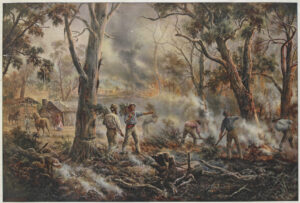[Editor: This article, regarding a painting by James Alfred Turner (1850-1908) of some men fighting a bushfire, was published in The Australasian (Melbourne, Vic.), 19 December 1908.]
Saving the homestead.

THE HOMESTEAD SAVED
An incident of the Great Gippsland Fire of 1898
This is no imaginary picture, but a real incident of the great Gippsland fires of 1898, and Mr. J. A. Turner, the painter of it, specially visited the scene, for the express purpose of transferring it to canvas, which he has done so successfully.
Mr. Turner, who passed away this year, was an artist who thoroughly understood the spirit of the great Australian bush, and could transfer it to canvas, not only sympathetically, but accurately, and with feeling for its loneliness, its simple grandeur, and its magnificent vastness. In the present picture he has been most successful in depicting the greatest terror that haunts those whose way of life is cast amongst the great spaces of the continent.
Only those who have ever experienced a bush fire know what a fearful thing it is. The hideous roar, the crackling of the undergrowth, timber crashing down, the blinding smoke, the tongues of flame darting from unexpected places, the stifling air and heat, and the speed of it all once experienced can never be forgotten. All Mr. Turner’s work is typically Australian, and, independently of the realistic incident, he has portrayed in the supplement picture, he has given an excellent landscape correct in every detail. The study of the great eucalypt in the foreground is a notable one, and wonderfully true to nature; so is the slab and bark-roofed hut, the shelter-shed at the back of it, the dry grass, the jumble of branches, timber, and stumps, clearing refuse in the foreground, and the bushmen themselves and their dress.
Source:
The Australasian (Melbourne, Vic.), 19 December 1908 (Christmas Number), p. 1570 (the painting was published as a colour supplement)
Editor’s notes:
The colour reproduction of Turner’s painting in the The Australasian of 19 December 1908 was listed as a featured item in advertisements for that issue (the Christmas Number).
See: “Order early: The Australasian Christmas Number will be published next week” (advertisement), The Argus (Melbourne, Vic.), 10 December 1908, p. 6, column 2 [“An Australian coloured picture, entitled “The Homestead Saved,” by the great Australian artist, the late Mr. J. A. Turner. A real incident of the Great Gippsland fires of 1898. Gratis.”]
dress = the clothes someone is wearing, clothing in general (as used in the phrases “manner of dress”; also “traditional dress”, “fancy dress”) (distinct from a “dress”, which is an article of clothing, worn by females, which cover the body and legs)
gratis = free, without charge; something given or a service supplied for nothing, at no cost, without payment, as a favour (derived from the Latin “gratis”, contraction of “gratiis”, meaning “as a kindness” or “as a favour”)
J. A. Turner = James Alfred Turner (1850-1908), artist; he was born in Bradford (Yorkshire, England) in 1850, came to Australia in 1873, and died in Canterbury (Vic.) in 1908
See: 1) Shirley C. Jones, “Turner, James Alfred (1850–1908)”, Australian Dictionary of Biography
2) Shirley Jones, A Quiet Painter: James Alfred Turner, Kilsyth (Vic.): Shirley Jones, 2009, p. 4
3) “James Alfred Turner”, Wikipedia
As the image of the painting (on the Trove site) in The Australasian (19 December 1908) was of relatively poor quality, the image was instead sourced from a duplicate published by the Globe Engraving Co.
See: “The homestead saved – An incident of the Great Gippsland Fire of 1898”, Globe Engraving Co. 19 December, 1908 (State Library of Victoria)
Leave a Reply